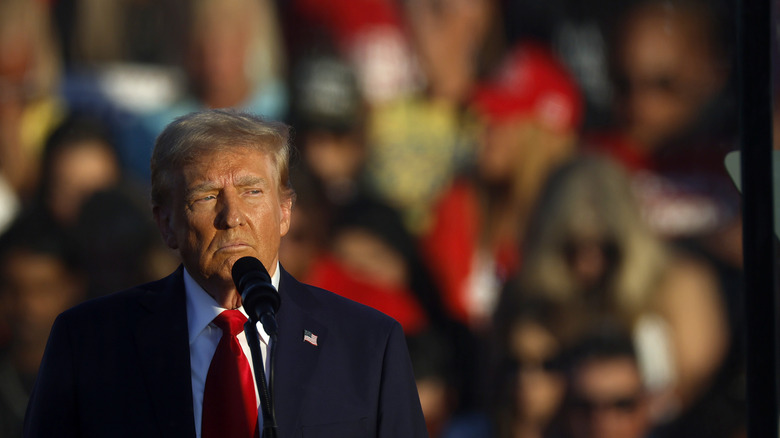Trump's Year After Historic Assassination Attempt Could Hold Complicated Trauma, Expert Says
We may receive a commission on purchases made from links.
On July 13, 2024, the world reacted to the attempted assassination of then-presidential nominee Donald J. Trump, and it became one of the major news stories of the year. In a piece for The Conversation, academic Lester Munson said the event "upended the U.S. election race." Indeed, Trump, a master self-promoter, turned the horrifying incident into political capital and even had it memorialized in a range of merchandise, including sneakers emblazoned with his bloodied image.
Despite nearly losing his life, some reports claim that during his medical assessment, Trump appeared delighted by what had happened. According to a new book, "2024: How Trump Retook the White House and the Democrats Lost America," the presidential nominee basked in the attention he received. "Trump kept talking about the shooting," it claims. "He couldn't believe it. He seemed to want to relive it over and over. ... Trump loved it. He was having a great time."
But the truth is that experiences like Donald Trump's near-miss are, for most, deeply traumatic. In an exclusive interview with Grunge, Dr. Sanam Hafeez, a neuropsychologist based in New York City and director of Comprehend the Mind, spoke more about the incident's potential effect on the president's psyche. Hafeez said she's certain that, despite his return to the White House, the event in question likely had a psychological impact on the sitting president — and it may become more pronounced on the anniversary of the assassination.
Donald Trump and the 'anniversary reaction'
After the assassination attempt that nearly cost Donald Trump his life, he returned to the campaign trail with a new messianic vigor. Indeed, it appears that he and his camp interpreted the near-miss as a sign of divine providence, an angle that played well with Trump's base. But though he seemingly embraced the event and appears on the surface to have suffered little if any mental trauma as a result of it, Sanam Hafeez claims that as July 13 rolls around, the president may feel different. "Even if someone isn't consciously thinking about the date, the body and mind may still recognize it, leading to mood changes, anxiety, irritability, or trouble sleeping," Hafeez told us, adding that the historic nature of the event adds a "complex layer to the healing process."
Hafeez explained that the psychological impact of traumatic events can be initially masked by shock, which may explain how Trump was able to roll with the life-threatening event and successfully fold it into his campaign. But twelve months later, things might be different. "The shock has worn off, and the emotional weight settles in," she explained. "One of the most important things to do is acknowledge what the body and mind are experiencing rather than brushing it off or trying to power through."
Trump himself has discussed the events of a year ago with Fox News, paying tribute to the fire chief, Corey Comperatore, who lost his life in the attack, and praising the sniper who took out the assassin, Thomas Matthew Crooks. He also reiterated his trust in the Secret Service, which attracted criticism in the wake of the attack. "I have great confidence in these people," he said. "I know the people, and they're very talented, very capable, but they had a bad day."
If you or someone you know needs help with mental health, please contact the Crisis Text Line by texting HOME to 741741, call the National Alliance on Mental Illness helpline at 1-800-950-NAMI (6264), or visit the National Institute of Mental Health website.
